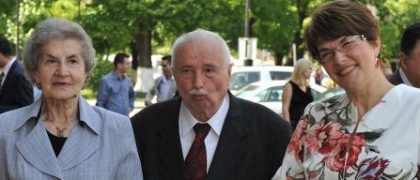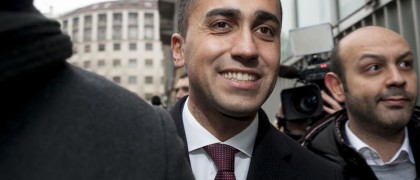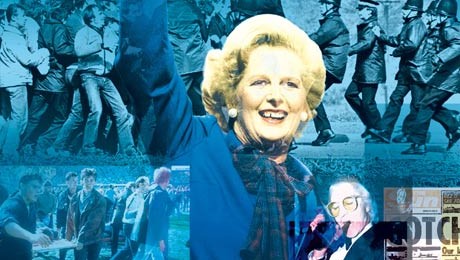Prin 1990, Margaret Thathcer l-a invitat Corneliu Coposu la Conferinţa Partidului Conservator britanic. Când s-a proiectat figura emblematicului lider anticomunist pe un ecran gigant, pe care scria 17 ani de temniţă, întreaga sală a Congresului s-a ridicat în picioare şi l-a aplaudat pe cel pe care Ţuţea l-a poreclite Seniorul, îşi aminteşte Mişu Barcan, şoferul liderului PNŢCD.
În acel an liderul charistmatic al Marii Britanii era în declin. Dar noi am venerat-ope doamna Thatcher pentru că a fost primul mare om politic care a intuit breşa numită Gorbaciov în cortina de fier a comunismului. Ea a fost cea care l-a sfătuit pe Ronald Reagan să dea o atenţie specială acelui “altfel de comunist”. Şi nu s-a înşelat. Şi datorită viziunii sale am scăpat de regimul de teroare.
N-a fost iubită, ci respectată, nu a amăgit societatea, a aranjat-o pe un sistem de reguli, n-a dat de pomană, a pus lumea la muncă, n-a tăiat salariile militarilor, i-a trimis la luptă şi astfel a dobândit un prestigiu enorm.
A fost cel mai radical lider european. A riscat, pariind pe ideile grupului Chicago Boys, din şcoala lui Friedmann, iar reformele sale reprezintă astăzi cazuri de succes din literatura economiilor lumii.
Poate mulţi s-au mirat când au auzit-o pe Maryl Streep din Iron Lady: “eu nu mi-am negociat niciodată principiile”. Aşa era Doamna de Fier, titlul provenit din batjocura politburoului de la Kremlin. Şi l-a asumat. Şi de aici un om. O viaţă. O amprentă.
Poate de la cosangvina în ideologie şi rezistenţă, Margaret Thatcher, Corneliu Coposu a preluat sitagma: “Noi nu ne negociem principiile.”
PS. Îmi aduc aminte că am rămas odată în cabinetul primului ministru Theodor Stolojan cu un grup de vreo 20 de lideri ai minerilor, extrem de gălăgioşi. Îşi cereau drepturi cam prea mari. La un moment dat, unul dintre ei, m-a strâns de mână şi m-a întrebat eu ce spun. Spăşit i-am spus doar atât: “În locul lui Stolojan făceam ca Margaret Thatcher.” Noroc că purtătorul de lămpaş nu ştia că Doamna de Fier a ţinut aproape doi ani liderii minerilor din Manchester în greva foamei. Pentru prima oară am fost şi eu solidar cu un lider fesenist. Asta era după a treia mineriadă. Lucram la “România liberă.”
Taguri: corneliu coposu, Doamna de Fier, Iron lady, margaret thatcher, ronald reagan







Comentariu (1)
Apr 9, 2013
John Galt
Actually era Hayek, nu neaparat Friedman, desi a avut treaba si cu el.. 🙂
John Ranelagh writes of Margaret Thatcher’s remark at a Conservative Party policy meeting in the late 1970’s, “Another colleague had also prepared a paper arguing that the middle way was the pragmatic path for the Conservative party to take .. Before he had finished speaking to his paper, the new Party Leader [Margaret Thatcher] reached into her briefcase and took out a book. It was Friedrich von Hayek’s The Constitution of Liberty. Interrupting [the speaker], she held the book up for all of us to see. ‘This’, she said sternly, ‘is what we believe’, and banged Hayek down on the table.”
(John Ranelagh, Thatcher’s People: An Insider’s Account of the Politics, the Power, and the Personalities. London: HarperCollins, 1991.)
Our inspiration was less Rab Butler’s Industrial Charter than books like Colm Brogan’s anti-socialist satire, Our New Masters . . and Hayek’s powerful Road to Serfdom, dedicated to ‘the socialists of all parties’. Such books not only provided crisp, clear analytical arguments against socialism, demonstrating how its economic theories were connected to the then depressing shortages of our daily lives; but by their wonderful mockery of socialist follies, they also gave us the feeling that the other side simply could not win in the end. That is a vital feeling in politics; it eradicates past defeats and builds future victories. It left a permanent mark on my own political character, making me a long-term optimist for free enterprise and liberty ..”
(Margaret Thatcher, The Downing Street Years, New York: Harper Collins, 1993, pp. 12-13.)
Oricum, un articol bun. I-am dat share si eu.